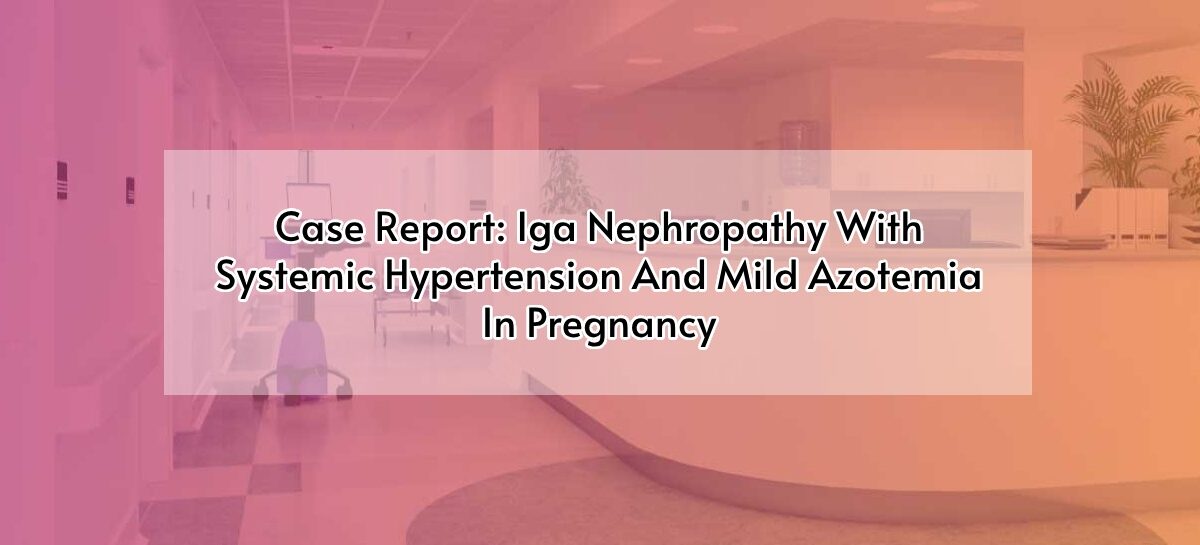Abstract
This case report discusses the management and outcomes of a 28-year-old female, gravida 2, para 2, with a known case of IgA nephropathy complicated by systemic hypertension and mild azotemia during pregnancy. Despite the challenges posed by concurrent renal and hypertensive disorders, timely intervention and multidisciplinary care led to favorable maternal and fetal outcomes.
INTRODUCTION
IgA nephropathy is a common glomerular disease characterized by the deposition of IgA antibodies in the glomeruli. When complicated by systemic hypertension and mild azotemia during pregnancy, the management becomes more complex due to the increased risk of maternal and fetal complications.
CASE PRESENTATION
A 28-year-old female, gravida 2, para 2, presented at 18 weeks gestation with a known history of IgA nephropathy diagnosed five years prior. She had aborted her previous pregnancy. However, during the current pregnancy, her blood pressure readings were consistently above 140/90 mmHg, with mild azotemia, with serum creatinine levels at 1.8 mg/dL through out her pregnancy with proteinuria of less than 500mg/dl.
CLINICAL PRESENTATION
The patient was asymptomatic, with no complaints of urinary symptoms or edema. However, laboratory investigations revealed mild azotemia and proteinuria consistent with her baseline levels. Blood pressure measurements were consistently elevated, indicating systemic hypertension.
MANAGEMENT AND FOLLOW-UP:
Given the dual diagnosis of IgA nephropathy with systemic hypertension and mild azotemia, the patient’s management involved close monitoring of renal function, blood pressure, and proteinuria. Antihypertensive medications deemed safe in pregnancy, such as labetalol, were initiated to control blood pressure.
Regular antenatal visits were scheduled to assess fetal growth and monitor for signs of preeclampsia. Additional laboratory tests, including 24-hour urine protein quantification and renal function tests, were performed to evaluate disease progression and assess the need for further intervention.
PREGNANCY OUTCOME
Despite aggressive management of systemic hypertension and mild azotemia, the patient had an uneventful pregnancy course. She delivered a healthy baby boy via LSCS at 35 weeks gestation, with no maternal or neonatal complications.
POSTPARTUM FOLLOW-UP:
Following delivery, the patient’s blood pressure gradually normalized, and renal function improved, returning to baseline levels. She was advised to continue regular follow-up with both nephrology and obstetrics teams to monitor for any signs of disease relapse or progression.
DISCUSSION
This case underscores the challenges of managing IgA nephropathy complicated by systemic hypertension and mild azotemia during pregnancy. Close monitoring and timely intervention are essential to prevent maternal and fetal complications, including preeclampsia, preterm delivery, and renal dysfunction.
CONCLUSION
Optimizing outcomes in pregnancies complicated by IgA nephropathy, systemic hypertension, and mild azotemia requires a multidisciplinary approach involving nephrology, obstetrics, and maternal-fetal medicine specialists. Through careful monitoring and individualized management, favorable outcomes can be achieved for both mother and baby.
REFERENCES
1. Coppo R, D’Amico G. Factors predicting progression of IgA nephropathies. J Nephrol. 2005;18(5):503-512.
2. Tangren J, Nadel M, Hladunewich M. Pregnancy and glomerular disease: a systematic review of the literature with management guidelines. Clin J Am Soc Nephrol. 2017;12(11):1862-1872.
3. Wyld MLR, Chadban SJ, Staples MP, Murphy E, Eris JM. Pregnancy outcomes in IgA nephropathy: a cohort study. Am J Kidney Dis. 2019;74(1):50-56.
4. D’Amico G. The commonest glomerulonephritis in the world: IgA nephropathy. Q J Med. 1987;64(245):709-727.
5. Roberts JM, Pearson G, Cutler J, Lindheimer M. Summary of the NHLBI Working Group on Research on Hypertension During Pregnancy. Hypertens Pregnancy. 2003;22(2):109-127.
6. Moroni G, Quaglini S, Gallelli B, Banfi G, Passerini P, Messa P. Pregnancy in women with IgA nephropathy: a challenge for the clinician. J Nephrol. 2019;32(4):543-550.
7. Lim PS, Soh MC, Lim CH, et al. Pregnancy outcomes of patients with primary immunoglobulin A nephropathy: a systematic review. J Obstet Gynaecol Res. 2019;45(5):911-920.
8. Julian BA, Waldo FB, Rifai A, Mestecky J. IgA nephropathy, the most common glomerulonephritis worldwide. A neglected disease in the United States? Am J Med. 1988;84(1):129-132.
9. Levy M, Berger J. Worldwide perspective of IgA nephropathy. Am J Kidney Dis. 1988;12(5):340-347.
10. Radford MG Jr, Donadio JV Jr, Bergstralh EJ, Grande JP. Predicting renal outcome in IgA nephropathy. J Am Soc Nephrol. 1997;8(2):199-207.
 Dr Farhan Ali
Dr Farhan Ali
DnB Nephrology Resident
Kauvery Hospital, Chennai



